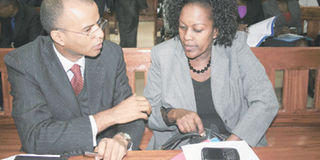Elect 72 women MPs or forget Parliament

FILE | NATION
Lawyers Philip Murgor and Judy Thong’ori during the hearing of a petition to stop appointment of judges of the Supreme Court. Ms Thong’ori vows to go to court next year is law on gender representation if flouted
Experts have warned that the country could be thrown into a constitutional crisis if the number of women does not hit the 116 mark in the next National Assembly and at least 23 in the Senate.
Elections chief Issack Hassan, former House Speaker Francis ole Kaparo, Safina presidential candidate Paul Muite and lawyer Judy Thong’ori fear that the composition of the two organs would be considered unconstitutional if the requirement is not met.
The new Constitution decrees that no more than two thirds of any institution should constitute one gender. To satisfy this demand, 72 constituencies must elect a woman MP next year.
Ms Thong’ori said the constitutional provision on gender balance must be respected at all costs. She has promised to go to court “the very next day” to stop Parliament or Senate from sitting if the numbers of either gender exceed two thirds.
A low number of women, according to Mr Kaparo, would force a return to elections to reconstitute Senate and the National Assembly.
“This section of the Constitution was not well thought out,” he told Sunday Nation.
“We are saying that some constituencies will be forced to elect women. What would be the criteria? What would happen if the one-third is not met even after a repeat of elections?” he posed.
Political scientist Karuti Kanyinga reckons the representation of women may precipitate a constitutional amendment.
“There is a crisis with the election of women. Whatever approach you use you can’t get one-third of women elected. We have to think about amending the Constitution. Otherwise the next Parliament will be unconstitutional,” he argues.
Mr Hassan says the way out is to come up with a formula that would compel political parties to reserve certain seats for women during nominations. “It may look very controversial, but this is the only way to get out of the impending crisis,” he said.
But even then, there is no guarantee that the women nominated by political parties would not be rejected by voters.
The formula accepted by some women groups is to divide the 290 constituencies into groups of four constituencies.
Then the lots are cast among this group of four, so that in 2012 one constituency will have to ensure that all candidates for the post of MP in the polls are women. “This constituency can only elect a woman.
Then in the next election, this goes to the next constituency, then the next until all the four are done. So, every four elections, the constituencies will know that they have to elect a woman,” argues Wambua Kanyi of Women’s Political Alliance.
Using this formula, 72 constituencies will have women.
Add this to the 47 women to be elected from each county and the six nomination slots and you get 125, which is slightly more than one third of the 349-member National Assembly.
The rotation would ensure men are not eternally denied their right to run for elective posts.




